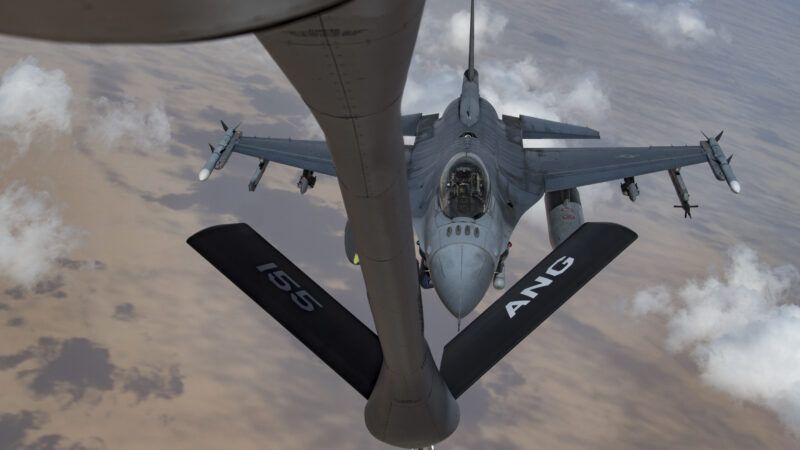Biden Opens the Floodgates on Weapons for the Middle East
The president is reversing a ban on selling offensive weapons to Saudi Arabia and advancing taxpayer-funded military aid to Israel.

It's been a good week for the weapons industry. President Joe Biden signed off on order after order allowing American weapons to flow to Middle Eastern regimes. On Tuesday, The Wall Street Journal reported that the Biden administration will sell shipments of bombs worth $750 million to Saudi Arabia, breaking its ban on selling "offensive weapons" to the kingdom.
On the same day, the State Department announced over $20 billion in new arms sales to Israel, including fighter jets, armored vehicles, and ammunition. And the Friday before, the administration removed several major barriers to arming the Israeli military. It released $3.5 billion in U.S. taxpayer money for the Israeli military, unfroze a $262 million munition shipment that had been held up since May, and decided not to restrict U.S. aid to an Israeli army unit accused of beating an American to death.
Biden came into office promising to end "forever wars" in the Middle East. He pulled U.S. forces out of Afghanistan and oversaw a truce in the Yemeni civil war. Over the past year, however, Biden has reopened the war in Yemen and overseen the deadliest explosion of Israeli-Palestinian violence in history. His legacy may be ensuring that American weapons continue to fuel these conflicts after he leaves office.
For years, the United States supported the Saudi military in Yemen with aerial refueling, intelligence sharing, and a steady supply of ammunition—everything but dropping the bombs themselves. The war killed hundreds of thousands of Yemenis, spread famine and disease, and failed to dislodge the Houthi movement from power.
In February 2021, Biden announced that he was "ending all American support for offensive operations in the war in Yemen, including relevant arm sales," although he would continue to provide "defensive" support. In April 2022, the United Nations successfully brokered a ceasefire between the Saudi-led coalition and the Houthis that has held up so far.
But after a series of Houthi attacks on Israeli and foreign shipping in the Red Sea, the Biden administration launched the first direct U.S. strikes on Houthi forces—and the first airstrikes by anyone on Yemen in more than a year—in January this year.
The Saudi government has not stopped pushing for U.S. military support. This week, they got their wish, with Biden approving a sale of 3,000 Small Diameter Bombs and 7,500 Paveway IV bombs over the next few months. Biden administration officials have said that shipments would not affect the Saudi-Houthi truce and hinted that they were meant to signal tighter U.S.-Saudi military cooperation in the future, The Wall Street Journal reported.
Biden has been a much more consistent supporter of the Israeli military campaign in Gaza following the October 7 attacks on Israel. Although he has verbally called for a ceasefire and held up a single shipment of bombs to the Israeli military, Biden has also worked to remove legal roadblocks and conceal the full amount of U.S. military support to Israel, including sending dozens of small shipments just below the threshold that would require congressional approval.
Earlier this year, Congress passed a $14 billion aid package for Israel. It included funds to replenish weapons that had been sent to Israel from U.S. military warehouses and direct financial grants to the Israeli government. On Friday, the Biden administration released $3.5 billion in those grants.
Most of the Israeli military spending bonanza announced over the past few days is not intended for use in Gaza. The largest portion of this expenditure is an $18.82 billion deal for F-15 fighter jets and related accessories, with deliveries scheduled for 2029.
The $262 million munition shipment, however, is immediately useful for the Israeli military. It includes 6,500 joint direct attack munition (JDAM) kits and a GPS guidance system for aerial bombs. Biden had held up the JDAM sale after the Israeli army invaded Rafah, displacing hundreds of thousands of Palestinians.
On Saturday, the Israeli military bombed a school and mosque with at least one American-made guided bomb, killing 93 people at dawn prayers. Israel claims that the attack killed 31 militants; the nonprofit Euro-Med Human Rights Monitor and Al Jazeera report that several of the "militants" on Israel's list were either people who had died several days before or had no Hamas ties.
Last month, Israeli forces dropped eight 2,000-pound bombs with JDAM kits on a tent city, killing Hamas commander Mohammad Deif along with 90 bystanders.
In addition to freeing up more money and munitions, the Biden administration moved to lift restrictions on how Israel can use this aid. A rule known as the Leahy Law forbids U.S. military aid from going to human rights abusers. In April 2024, the U.S. State Department announced a Leahy investigation into Israel's Netzah Yehuda Battalion.
Netzah Yehuda had been accused of abusing Palestinian civilians in the West Bank, including Palestinian-American retiree Omar Assad, who died in their custody in January 2022. No soldiers were charged in connection with Assad's death. In October 2021, Israeli police arrested four Netzah Yehuda troops for sexually assaulting a Palestinian detainee; one soldier pleaded guilty and was sentenced to four months in prison.
The Israeli government opposed any kind of "sanctions" on soldiers who are "fighting terrorist monsters." So did Republicans in Congress. Sen. Marco Rubio (R–Fla.) called the investigation "an effort by President Biden to appease Israel's enemies, including the antisemitic mobs terrorizing college campuses across America."
On Friday, the State Department said that Israel had "effectively remediated" the problems with Netzah Yehuda by giving the troops a "two-week educational seminar." The unit is now free to continue receiving weapons paid for by the American taxpayer.


Show Comments (78)